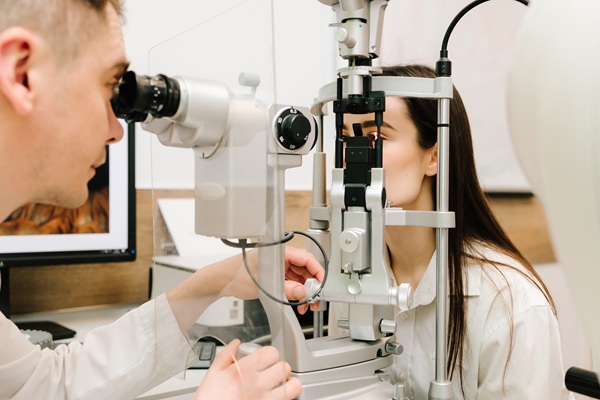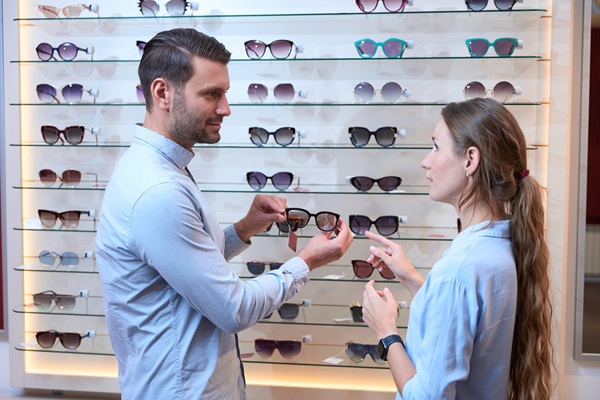Visiting Your Eye Doctor: What To Expect

For those who have never had an eye exam or who have not had a checkup in a long while, a visit to the eye doctor can be an intimidating experience. Some people put off a visit to the optometrist if there are no known issues with their vision, but even those with excellent eyesight should still attend regularly scheduled eye exams for early disease detection and anatomical analysis. Knowing what to expect during the first appointment helps the patient come prepared and sets the nerves at ease.
What to expect at an eye doctor visit
Although the specific tests depend on the reason for the patient's visit, an initial eye exam includes several diagnostic procedures. The practitioner makes a diagnosis by analyzing the results of these examinations and recommending a treatment plan.
Medical and eye history
During their first eye doctor visit, patients need to disclose their medical history and any current issues they are experiencing. The optometrist needs to take medical history into consideration since some conditions such as diabetes can affect vision. Medical history is recorded through written or oral questionnaires that include inquiries about family history of eye disease.
Vision testing
Simple vision tests are given, similar to those performed during a regular physical in a doctor's office. The patient reads from a chart containing random letters to check both close-up vision and vision at a distance. Eye doctors also perform tests for color perception and peripheral vision.
Physical eye exam
The physical eye exam is the most specialized portion of an eye doctor visit. First, the patient is given drops to dilate the pupils so the optometrist can clearly view the interior of the eye and look for abnormalities. Using specialized tools and light sources, the eye doctor can evaluate the health of the exterior and interior eye. Dilating drops cause light sensitivity for several hours, so the patient is directed to wear sunglasses or special eye shields until the effects wear off.
Glaucoma testing
Some patients are tested for signs of glaucoma during a process called tonometry. During tonometry testing, an optometrist places a small, pencil-like device called a tonometer against the numbed eye to measure the pressure. A puff of air may also be used to check eye pressure. If the level is higher than normal, it is a sign of fluid build-up and could be a symptom of glaucoma.
Recommendation for treatment
After all exams are completed, the eye doctor recommends a course of treatment if one is needed. Treatment could include vision correction such as glasses or contacts. If diseases are identified or surgery is required, an optometrist makes a referral to an ophthalmologist for further evaluation.
Conclusion
Eye doctors recommend scheduling an eye exam even if there are no known vision problems. During the first visit, the optometrist gains a full picture of the health of the eyes and develops a treatment plan if there are any vision concerns. Knowing what to expect during a visit to the eye doctor helps patients come in prepared and relaxed.
Request an appointment here: https://brighteyesny.com or call Bright Eyes Optometry at (914) 730-9574 for an appointment in our New Rochelle office.
Check out what others are saying about our services on Yelp: Read our Yelp reviews.
Recent Posts
Ophthalmologist and optometrists are two of the main eye care professionals. Both play an important part in helping you maintain the health and function of your eyes. However, while each type of eye doctor provides vision care, knowing the care you need can be confusing. Choosing the appropriate eye care provider depends on individual needs,…
Sunglasses have become a part of many people's wardrobes; however, they are also a great tool for protecting the eyes. Along with playing a large role in our daily lives, eyes are also sensitive to many things—sunlight being one of them. It is easy for one's eyes to sustain damage from direct sunlight exposure. Thankfully,…
A comprehensive eye exam does more than assess vision; it can also reveal early signs of various health conditions. Many systemic diseases affect the eyes before other symptoms appear, making regular exams essential to overall health care. Optometrists use advanced diagnostic techniques to detect conditions beyond vision problems, allowing for early intervention and treatment.Routine eye…
Cataracts are a common vision impairment that primarily affects older individuals, leading to clouded visions and, in some cases, blindness. Fortunately, cataract treatment provides effective solutions to restore sight and improve people's overall quality of life. Optometrists can use these advanced methods to improve precision, reduce recovery time, and lead to better treatment outcomes.Cataracts develop…


